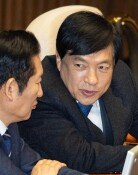[Editorial] Joint Efforts for Investment and Job Creation
[Editorial] Joint Efforts for Investment and Job Creation
Posted January. 16, 2010 07:27,
The top 30 Korean conglomerates plan to invest a combined 87.02 trillion won (77.6 billion U.S. dollars), and hire 79,199 workers this year. The investment figure is up 16.3 percent from last year and that of hiring is 8.7 percent higher. Business groups including Samsung, Hyundai-Kia, LG, POSCO and SK announced their commitment to aggressive management in a meeting of their chairmen yesterday. More than a few groups hinted at additional investment and hiring should conditions allow.
The Korean economy performed fairly well last year despite the global financial crisis. The achievement was due in large part to the governments expansionary fiscal policy, but was also buttressed by private sector contributions, especially from conglomerates. Last year, the top 30 groups saw investment decline 8.6 percent and hiring fall 13.9 percent, but these drops were smaller than those of their counterparts overseas. As of last year, the 30 conglomerates employed 893,117 staff, up 1.6 percent from 2008. This indicates that the business community avoided layoffs in contrast to the massive downsizing that occurred in the Asian financial crisis in the late 1990s.
The private sector has a bigger role to play this year because the governments spending capacity has declined. Conglomerates exert a huge trickle-down effect on the economy, and must take the lead in boosting investment and employment in spearheading the expansionary mood in the industrial sector. In the past, conglomerates sometimes announced ambitious business plans in view of the governments stance and public opinion, but failed to keep their promises. Such a practice should not recur this year.
In his meeting with the chairmen of the 30 groups, President Lee Myung-bak said, The government is considering various policy incentives for domestic investment. His administration must speed up follow-up measures aimed at boosting investment, including the cultivation of the service industry given its effectiveness in job creation and drastic deregulation. Rule of law and principles must take root when it comes to labor matters. If a policy measure is deemed to be potentially helpful to job creation and investment, the government must boldly persuade the public instead of backing down from collective instigation or protests by special interest groups. If the government makes the most of the monthly meeting to start this year on national employment strategy chaired by the president, it could generate the same effects as those from the export promotion and expansion meeting under the Park Chung-hee administration.
Legislation and revision of laws and regulations for boosting investment and jobs require political cooperation. Both the ruling or opposition parties should prepare to help these efforts and support a policy that can potentially increase jobs and boost investment, rather than merely making sound bites of benefiting the people and jobs. It is high time that companies, the government and the political circle join forces to help create jobs, and increase investment to raise employment.



![“잠만 자면 입이 바싹바싹”…잠들기 전에 이것 체크해야 [알쓸톡]](https://dimg.donga.com/c/138/175/90/1/wps/NEWS/IMAGE/2026/02/23/133404749.3.jpg)



